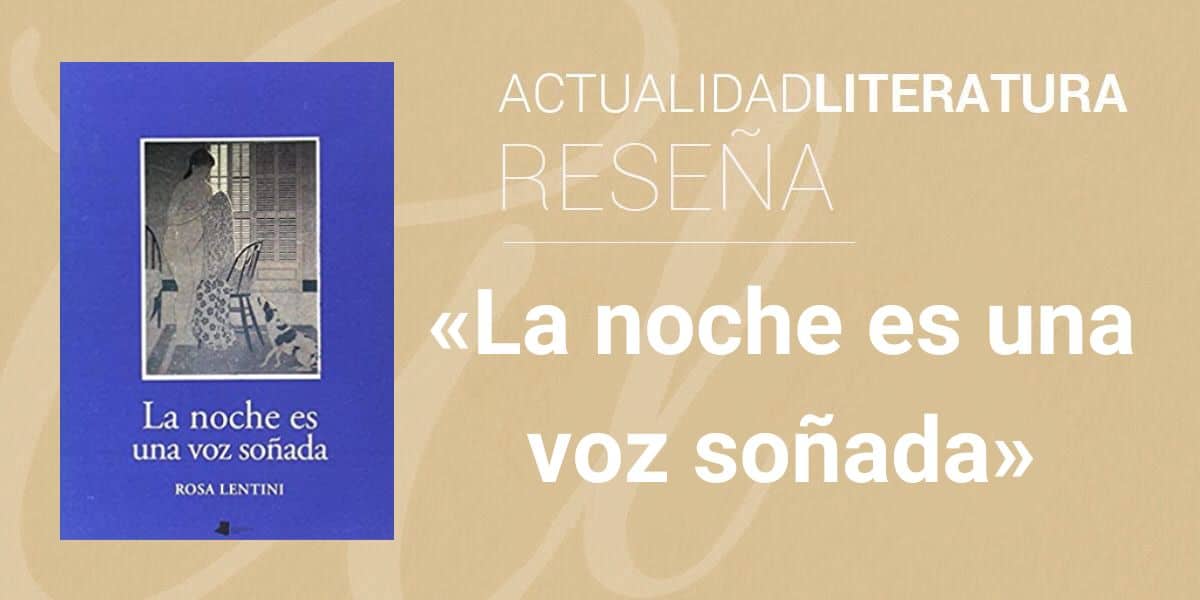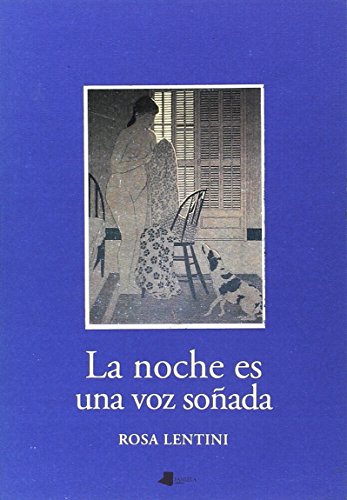
The night is a dream voice
The night is a dream voice is the first poetic anthology written by the Barcelona-based translator and critic Rosa Lentini. The work belongs to the collection Siren, and was published by the Pamiela Argitaletxea publishing house in 1994. This book is marked by a humanist quality; in this sense, it is also loaded with a characteristic of femininity.
According to the author's own statements, in her poetry it is possible to find characteristics of literature written by women: an unequivocal exaggeration of privacy and intimacy. No other expressive ostentation is needed to make it understandable, since subtlety and insinuation are everything.
About The night is a dream voice
Through the pages, poems, verses and signs of The night is a dream voice Much is said, without revealing all the secrets. This is possible thanks to a resource very well applied by Lentini: the hint. We see this present in fragments such as: “… I see your tense thighs that they keep for themselves / their thinnest and most secret skin” (from “In sleepless hours like rocks”).
"The night is a dream voice It is suitable as the vertex of Lentini's journey of poetic light. Voice of electric lichens, continuously inquisitive, wounded to itself, on itself”, Reviewed by Yeni Zulena Millán in The chronic (2017) The work itself is a recursive song where several intimate aspects of the author converge.: the love of the lover —in the sensual and sexual— and his figure before the eyes of the other, the lightness of being, his trifle before time...
Analysis of some poems by The night is a dream voice
"Now that the night whispers to me"
Now that the night whispers to me that the night whispers to me that she and the water are one
presence, now that the voice of the water returns and invades us, now that in that religion of water
I have forgotten to talk to you and talk to me and therefore name the world and its gestures, you should
insist, so that he remembers to say "your hands" for example, or "my tongue", so that he does not forget
that it is with the lips, the tongue and the teeth of the origin with which we watch over our names, beyond that frightened mouth, asleep and forgotten by all, perhaps because of the memory
of that saliva and of those teeth in your mouth, that anxiously lick your tongue, so that she tells me, so that she rests with me in the water without fluid, and does not remember that the water and the
night are two absences that grow on the same name.
brief analysis
"Now that the night whispers to me" is composed in poetic prose. In his first sentences you can see how Through the words "water" and "now" the author draws the space and temporality where the discourse later takes place. There, in that concise and dense recreated environment, that intimacy of feminine feeling —so unique— about which the author herself speaks in comments alluding to the work, is strongly presented.
Water —the most prominent word— also serves as a metaphor for memory, oblivion, and self-inflicted wounds. The figure of the lover is also present with a familiarity that shows how brief the existence of the being can be. human.
"In sleepless hours like rocks"
In sleepless hours like rocks
I see your forehead wounded by the air,
your back that the air discovers and explores,
your mouth half-opening and your hollow hands
oreadas in the density of the night.
I hear you burn in unveiled, long gestures,
I see your taut thighs that they keep to themselves
its finest and most secret skin;
I only have your eyes closed to the mystery of the air.
brief analysis
Unlike the previous poem, "In sleepless hours like rocks" a freer structure and a much more evident image are presented. Here, Rosa Lentini describes the actions of a lover during the culmination of an intimate act, and how the one who feels and lives him, also admires him.
The poet addresses the culmination of a passionate moment with a prose that allows you to be a little more explicit, but without ever reaching inelegance.
Other poems by Rosa Lentini
During her literary work, Rosa Lentini has published several poetry anthologies. Among them are: egypt notebook (2000) south to me (2001) the four roses (2002) The poison and the stone (2005) Transparencies (2006) We had (2013), y beautiful nothing (2019). To delve deeper into the author's work, some of her most beautiful lyrical texts are left.
"The damage" of south to me
From the umbilical cord of questions
just throw out what burns,
a sustained bet,
a remote and docile color gone.
We lost even the trace of rage
in sleepless worlds
night and humidity
they filled your song with dust,
and now you welcome the pale silence
that brings the echo closer to the sacred.
Beyond the words are sewn to the voice,
tongues are dressed with breath
that fade into mirrors,
So the image of the world
still waits in the bush,
with a new wonder and empty time.
Of loneliness and emptiness
Rosa Lentini's poetic prose usually addresses themes such as loneliness, whose shadow is imposed on those who, out of habit, lose the ability to communicate, leaving only a “pale silence”. Many people live in a lonely company, where there is no longer even anger; this is something that Lentini brilliantly exposes.
"Uninhabiting Shadows" by We had
The transit of their souls to deer
his avidity for water that oblivion
back watertight
in times of moulting.
The antlers are ripped
some skins fall into the pool.
Waves blur them, exiles.
everything has been prepared
even thirst does not catch them off guard
when they ask if they have been mocked
of the end, of his law.
They shine by asking as if the power
of the answer I could return them to the rain
to the halo that surrounds the shadows like an echo.
The heart beats the lip tick, tick,
sweetness puffs out the lip
and it beats without enough force.
The wait makes them
an infinite instant
─mouths and arms drooping
an ice rink to slide on─
and then let the weightless flower
of strangeness
do everything else.
Of change and of waiting
Once again, it is possible to find a melancholic aura behind read poetry of Lentini. In "Deviating shadows" a claim to change is shown in full view, a question that is never going to get a verbal answer and to which, however, it is not worth hearing a confession either.
About the author, Rosa Lentini

OLYMPUS DIGITAL CAMERA
Rosa Lentini was born in 1957, in Barcelona, Spain. Lentini, as the daughter of the Catalan poet Javier Lentini, grew up surrounded by the words of great authors, and she showed her interest in reading and writing from a very early age. Such was her passion that graduated in Hispanic Philology from the Autonomous University of Barcelona. Since then, his illustrious career has always focused on letters.
Currently, Lentini is co-editor of the magazine igitur, in the company of the writer Ricardo Cano Gaviria. In previous years, the poetess also was one of the founders of literary publications Asymmetry y poetry hour. The author has affirmed on several occasions that some of her greatest references are Javier Lentini, Truman Capote, Celan and Bonnefoy.
Some other poems by Rosa Lentini
of poems We had (2013)
- "Under things";
- “Poppies”;
- "The match";
- "The heat";
- "Brothers".
From the poems beautiful nothing (2019)
- "Giants 5".
